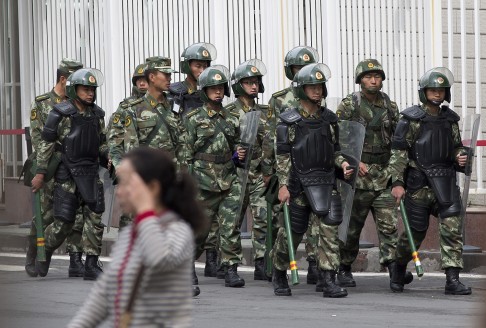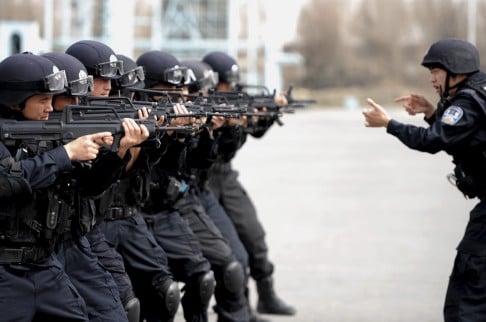From Thailand to the Philippines to Nigeria to Israel, Iraq, Lebanon, Russia … you name it, anywhere and everywhere there is a large population of Muslims, there come demands for an Islamic state.
Al-Qaeda magazine calls for Xinjiang to be ‘recovered by the Islamic Caliphate’, South China Morning Post, October 21, 2014, (thanks to Blazing Cat Fur)
Story continues below advertisementA new English-language magazine released by al-Qaeda describes China’s restive Xinjiang region as an “occupied Muslim land” to be “recovered [into] the shade of the Islamic Caliphate”.
Produced by the jihadist organisation’s As-Sahab media wing, the 117-page debut issue of Resurgence includes a feature titled “Did You Know? 10 Facts About East Turkistan,” referring to the name for Xinjiang used by those who advocate independence from China.
While much of the article is inaccurate – it claims, for example, that teaching the Quran is illegal in China (Islam is one of the country’s five recognised official religions) – it shows how China’s actions in the region, such as encouraging the migration of Han Chinese into Xinjiang and restricting religious dress, are being used by jihadist organisations to confirm their belief that Muslims are under threat.
Al-Qaeda is not the only jihadist organisation which has expressed an interest in the situation of Muslims in Xinjiang. In July, Abu Bakr al-Baghdadi, the self-styled caliph of the Islamic State, also known as ISIS or ISIL, spoke of Muslim rights being “forcibly seized” in China in a call for Muslims around the world to pledge allegiance to him.
“Your brothers all over the world are waiting for your rescue, and are anticipating your brigades,” Baghdadi told his followers.
“In recent years [jihadist organisations] have expressed an interest in the alleged oppression of Xinjiang Uygurs by the Han Chinese,” Ahmed Hashim, a terrorism expert and associate international studies professor at Singapore’s Nanyang Technological University, told the South China Morning Post. “China is being seen as an oppressive power as it grows in strength.”
“The contact between Uygur separatists and jihadists has been rather limited but is increasingly facilitated by Uzbek jihadists in recent years in remote regions of Pakistan,” he said.
China has long maintained that separatist groups in Xinjiang have links to foreign jihadist organisations. After the September 11 terrorist attacks on New York and Washington, Beijing lobbied for the East Turkestan Islamic Movement (ETIM) to be placed on the United States’ terrorist watch list.
ETIM – which experts say is more of an umbrella term used by the Chinese government for a number of different groups, including the Turkestan Islamic Party (TIP), than an actual cohesive organisation – has been accused by Beijing of involvement in a number of terrorist incidents in recent years, including the Kunming Railway Station massacre in March which left 31 people dead and injured 141.
While leaders of TIP, believed to be based in Pakistan’s lawless tribal region, have voiced support and even claimed credit for some attacks in China, some have questioned the group’s ability to carry out terrorist plots thousands of kilometres away.
The influence of foreign jihadist organisations on events in Xinjiang has also been questioned. While al-Qaeda and Islamic State have begun using the situation there in their propaganda, experts argue that the roots of the unrest ultimately lie in China’s policies in the region.
“Identifying external ‘provocations’ remains important to the narrative about Uygurs perpetuated by the Chinese state,” Sean Roberts, director of international development studies at George Washington University’s Elliott School of International Affairs, told Vice News last month.
Beijing, Roberts argues, believes its policies are “gracious and generous to the Uygurs and immune to criticism. Thus, if Uygurs are resisting the Chinese state, it must be due to external forces seeking to destabilise what is harmonious and prosperous.”
“When the approach taken by the Chinese government is a total clampdown then people will go in more extreme directions, that’s a natural response and we’ve seen it in a number of other situations,” Raffaello Pantucci, a senior research fellow at the Royal United Services Institute focusing on counter-terrorism and radicalisation, told the Post.
“Historically though, extremist Uygur groups have never been able to get the global [jihadi] movement to do much more than talk about their problems,” he said. “There’s a lot of rhetoric but it doesn’t translate into action.”
“The Chinese government has a tendency to say that any incident that takes place in China is affiliated to a foreign group, but it rarely goes into the particulars of who is behind and directing these plots,” Pantucci added.
Policemen from the SWAT team practice during a drill in Urumqi, Xinjiang region. Photo: Reuters
“China’s ongoing security crackdown in Xinjiang has forced the most militant Uygur separatists into volatile neighbouring countries, such as Pakistan, where they are forging strategic alliances with, and even leading, jihadist factions affiliated with al-Qaeda and the Taliban,” wrote Philip Potter, an assistant professor of public policy and political science at the University of Michigan, in a paper published earlier this year.
The allure of jihadist organisations – particularly the Islamic State, which has proven itself adept at waging online propaganda and recruitment campaigns – is strong for disillusioned young people in countries all over the world.
The International Centre for the Study of Radicalisation at King’s College London estimates that around 74 nationalities are fighting under the black flag of the “Caliphate”, including more than 500 British militants.
In July, China’s former special envoy to the Middle East, Wu Sike, said that around 100 Chinese citizens are fighting with the Islamic State in Iraq and Syria.
In an article last month, the state-run Global Times quoted an unnamed “anti-terrorist worker” as saying that Xinjiang militants who joined the Islamic State “not only want to get training in terrorist techniques, but also to expand their connections in international terrorist organisations through actual combat to gain support for escalation of terrorist activities in China.”
Uygur exile groups complain that Beijing already exaggerates the threat posed by terrorism to justify harsh crackdowns in Xinjiang.
The Truth Must be Told
Your contribution supports independent journalism
Please take a moment to consider this. Now, more than ever, people are reading Geller Report for news they won't get anywhere else. But advertising revenues have all but disappeared. Google Adsense is the online advertising monopoly and they have banned us. Social media giants like Facebook and Twitter have blocked and shadow-banned our accounts. But we won't put up a paywall. Because never has the free world needed independent journalism more.
Everyone who reads our reporting knows the Geller Report covers the news the media won't. We cannot do our ground-breaking report without your support. We must continue to report on the global jihad and the left's war on freedom. Our readers’ contributions make that possible.
Geller Report's independent, investigative journalism takes a lot of time, money and hard work to produce. But we do it because we believe our work is critical in the fight for freedom and because it is your fight, too.
Please contribute here.

or
Make a monthly commitment to support The Geller Report – choose the option that suits you best.
Quick note: We cannot do this without your support. Fact. Our work is made possible by you and only you. We receive no grants, government handouts, or major funding.Tech giants are shutting us down. You know this. Twitter, LinkedIn, Google Adsense, Pinterest permanently banned us. Facebook, Google search et al have shadow-banned, suspended and deleted us from your news feeds. They are disappearing us. But we are here.
Subscribe to Geller Report newsletter here— it’s free and it’s essential NOW when informed decision making and opinion is essential to America's survival. Share our posts on your social channels and with your email contacts. Fight the great fight.
Follow Pamela Geller on Gettr. I am there. click here.
Follow Pamela Geller on Trump's social media platform, Truth Social. It's open and free.
Remember, YOU make the work possible. If you can, please contribute to Geller Report.
Join The Conversation. Leave a Comment.
We have no tolerance for comments containing violence, racism, profanity, vulgarity, doxing, or discourteous behavior. If a comment is spammy or unhelpful, click the - symbol under the comment to let us know. Thank you for partnering with us to maintain fruitful conversation.
If you would like to join the conversation, but don't have an account, you can sign up for one right here.
If you are having problems leaving a comment, it's likely because you are using an ad blocker, something that break ads, of course, but also breaks the comments section of our site. If you are using an ad blocker, and would like to share your thoughts, please disable your ad blocker. We look forward to seeing your comments below.











